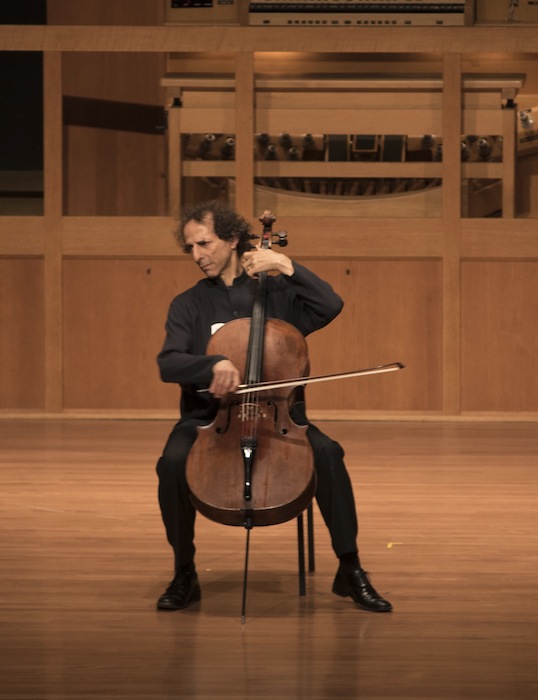Chamber Music Society opens Baroque month with a feast of solo Bach

Colin Carr performed Bach’s Cello Suite No. 3 Sunday night at Alice Tully Hall. Photo: Tristan Cook
One could go to fifty concerts at Alice Tully Hall without ever knowing that the main auditorium houses a full organ. For the vast majority of performances, the back wall of the stage is kept closed, barely hinting that it hides anything that would be of interest to an audience.
Just to walk into the room on Sunday evening for the Chamber Music Society of Lincoln Center’s “Solo Bach” concert was startling– seeing the majestic instrument looming behind the stage made an almost operatic coup de théâtre. Playing the Prelude and Fugue in D major on Sunday was Paul Jacobs, who re-inaugurated the organ back in 2010 after its restoration.
The instrument doesn’t ring quite as much as one might expect in a live hall like Alice Tully, but it has a firm, assertive voice, on the cool side, but never piercing. Jacobs let the organ roar in the Prelude, bellowing forth a mass of color. The fugue that followed was clearly voiced and crisply articulated, enlivened here and there by playful humor—nowhere more than when Jacobs shamelessly sold the false cadences near the end of the prelude. It is always a joy to hear Bach on Bach’s instrument.
The program opened with a lovely performance by Tara Helen O’Connor of the Partita in A minor for solo flute. O’Connor played with both clarity and warmth, spinning natural, breathing phrases. She showed delicate but marked metrical freedom, adding gentle tugs on the front of terraced phrases. Long, sequences of rippling scales are difficult to accomplish on a wind instrument, but her approach, finding the natural breaths in the music, made it sound entirely free. O’Connor was right at home in the music’s idiom, inhabiting the essence of the light, skipping bounce of the closing Bourrée Anglaise.
The Suite in E minor for Guitar received a superb performance from Jason Vieaux, whose playing was crisp, carefully and precisely voiced. He channeled reflective melancholy in the Allemande, with somber sighs following in the Sarabande. As is natural on a plucked instrument, his playing was mostly comparatively quiet, but he still managed a dynamic range of subtle variety.
Anne-Marie McDermott offered the English Suite in A minor for Keyboard, one of four items on the program written during Bach’s tenure at the court of Cöthen, where he concentrated on secular instrumental music. Her take on the piece was intelligent and sensitive, if occasionally impetuous. At her best, she showed a superb ability to vary color and convey emotion–the Sarabande in particular was gorgeously spun, an aching account that still kept the grace of the dance always in mind. McDermott did have a tendency to run away in fast movements; the closing Gigue was taken so fast that it was difficult to hear the play of the counterpoint. Nevertheless, even when she rushed she was able to toss off flowing passages with elegance.
The six Sonatas and Partitas for solo violin are jewels of that instrument’s literature, core pieces in every violinist’s repertoire. So it was surprising to hear an experienced player like Ani Kavafian deliver so unpolished a performance of the G-minor Sonata. The opening Adagio seemed disinterested, and was beset by many little deficiencies that added up to major distractions–choked sound after running out of bow, pitches that drifted in one direction before correcting to the other, and the like.
The Fugue, like the other two that Bach wrote for violin, is fiendishly difficult, featuring dense clusters of chords that feel decidedly un-violinistic. Kavafian’s struggle with the piece was audible, and even where she sounded comfortable with the notes her treatment of the fugue was academic. There was likewise little evidence of much affection for the music in the Siciliano, and for the closing Presto she chose a tempo at which she was not prepared to play cleanly. A surprisingly disappointing performance for such an accomplished artist.
Colin Carr fared much better in the Cello Suite No. 3 in C major; in fact, his performance stands out as a memorable interpretation of what is truly a touchstone work in the cello repertoire. From the opening line of the Prelude, a blissful sigh, this was an absolutely exquisite reading, hinting at deep wisdom even when the music moved through rapid, flowing passagework. He gave an easy, breathing reading of the Allemande, and even the Courante showed a richness and fullness of sound in every note. The first Bourée was a simple expression of complete contentment, a sentiment echoed and amplified in Carr’s buoyant, joyful reading of the closing Gigue.
The Chamber Music Society of Lincoln Center’s Baroque Festival continues wih “Italian Splendor” on December 11 and 13, and the complete Brandenburg Concertos December 16, 18, and 20. chambermusicsociety.org






